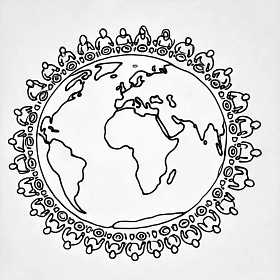The Passenger in 1A
Fond of a quiet flight or open to chance conversation? When the passenger in 1A doesn’t fit the expected mould, do you lean in or look away?
For those already working across borders, familiarity can become a limitation. This scenario-led series explores what shifts when leaders choose considered curiosity over comfortable routine. We focus on the quiet decisions where global intent sharpens into global action.
You’ve made your last call and are boarding the aircraft for a long-haul flight. You approach your seat, glancing towards your neighbour already sitting in 1A.
They appear relatively young. Quiet. Focused. And they’re not who you expected to see at the front of the plane. You may assume they have wealthy parents. Or, they’ve secured an upgrade. They might be on a scholarship.
Yet in 2025, there are other reasons they might be there. And these reasons are worth knowing.
In regions where digital adoption is rapid, demographics are shifting markets, and startup sectors are being built at speed - rather than youth being a barrier to success, it’s a multiplier.
You may be sitting next to:
Christelle Kwizera (Rwanda), whose company delivers clean water to hundreds of thousands in Rwanda through locally built solutions.
Kaivalya Vohra (India), who launched Zepto at 19 - India’s 10-minute grocery delivery unicorn.
Nadiem Makarim (Indonesia), who created Gojek and later joined Indonesia’s cabinet.
Temie Giwa-Tubosun (Nigeria): Founder of LifeBank, a healthtech platform using data and logistics to deliver blood and medical supplies. Named to BBC 100 Women and Africa Business Heroes.
Farida Bedwei (Ghana): Co-founder and CTO of Logiciel, providing micro-banking software for the unbanked. Named one of Africa’s most influential women in tech.
Moulaye Tabouré (Mali/Côte d’Ivoire): Co-founder of Afrikrea, an e-commerce platform connecting African fashion and craft creators to global markets.
Khulan Davaadorj (Mongolia): Founder of Lhamour, Mongolia’s first organic skincare brand, now exporting globally.
These leaders, and many others not listed here, are not outliers. They’re signals.
In Africa, Asia, and high-growth markets from Guyana to Mongolia, where more than half the population is under 30, these kinds of entrepreneurs and business leaders are increasingly flying high and leading further.
This brings us back to you:
Who do you talk to in the front of the plane?
Option 1: Seek Out the Professional
You strike up conversation with the individual who mirrors your background or status. You align upward. It’s productive. Yet it’s expected. Your worldview remains intact.
That’s one option. There are others, including:
Option 2: Talk to No One
You keep to yourself. Headphones on. A meal, a film, some rest. You arrive unshaken, unchanged. No reach. No risk. No shift.
Option 3: Talk to The Passenger in 1A (Experience-Based)
You talk to your neighbour but lead with your experience. You’re generous, although not necessarily curious.
You feel helpful. Yet it dawns on you, as you see a senior government official meet them at the gate, that you might have missed the bigger picture.
Option 4: Talk to the Passenger in 1A (Exploration-Led)
You ask questions. You listen. You trace their trajectory. You explore their market. And what begins as idle chat becomes an entry point to something more expansive.
The choice may seem small. However the implications often are not.
Why We Default.
If you went with Option 1, you’re not the only one.
Social network theory calls this homophily; our tendency to connect with people who look like us, think like us, or come from similar backgrounds. While comforting, it reinforces blind spots. Research by McPherson, Smith-Lovin, and Cook (2001) shows that homophilous networks restrict access to new ideas and opportunities. In global business, this limits perspective.
Shifting that requires intentional proximity to difference. Not just sitting elsewhere, but staying curious while you’re there.
The Unexpected Conversation
Often, the most valuable part of the journey isn’t the destination; it’s the conversation you didn’t expect to have.
Especially when travelling to high-growth low- and middle-income economies, where quiet revolutions in tech, demographics, and policy are underway, the seat beside you might hold not just a fellow passenger, but a glimpse into the future.
These business models don’t need validation from the global north. Yet they might reshape your strategy.
Where you go matters.
Who you sit beside may matter more.
Because when we see more, we move smarter.
Who do you talk to in the front of the plane?
Next in Crossing Borders:
The Briefing.
What you know before you land, shaped by smart tools, sharp networks, and a curious mind, can shift who you meet, what you spot, and the doors that open.
Next, Network Here.
Many leaders in advanced economies still prefer to do business with their counterparts in similar markets. These partnerships feel secure - based upon familiar business environments, existing relationships, and robust financial systems. Yet this approach risks missing the bigger picture.
Opportunity exists beyond these familiar places and faces.
Global Shifts in Power: What are the New Places, New Faces?
“To hold a pen is to be at war.” - Voltaire
In the 18th Century, when French Enlightenment writer, philosopher, and historian Voltaire lived, that power could cause war. During that time, power was largely centralized in Europe. It has shifted since then and continues to move. Today, economic opportunity is being democratized in the digital age, with countries that have younger populations and entrepreneurial tendencies playing an important role.
This signals what global power may look like in the future.
As leaders, it is valuable to consider: which people will emerge to hold global power?




